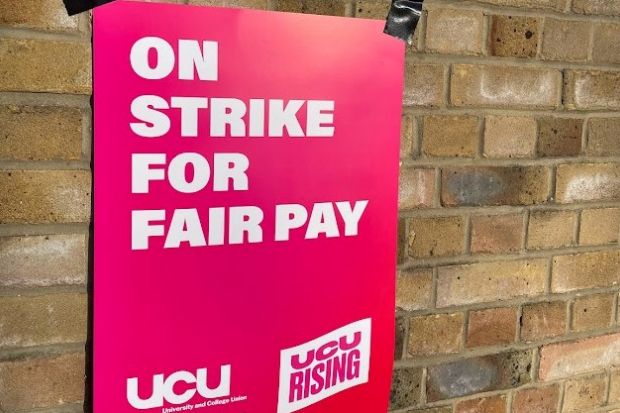The UK’s largest higher education union has rejected universities’ final pay offer, triggering a series of dispute resolution meetings.
The Universities and Colleges Employers Association (Ucea) had offered an increase of a minimum of 2.5 per cent, rising to 5.7 per cent for the lowest paid, but only £900 of it would come in August, with the rest to follow in March 2025.
But the University and College Union’s (UCU) higher education committee has voted to reject the offer and seek an improvement via dispute resolution meetings, according to general secretary Jo Grady.
Dr Grady said that negotiators “have already moved the employers significantly” and “it may be possible to avoid triggering a formal trade dispute”.
But a question mark hangs over whether UCU members will ultimately support industrial action, with long-running strike action coming to an end last year after only 43 per cent of members voted, missing the 50 per cent minimum turnout requirement.
In a poll of UCU branches, 51 per cent of delegates said that they would vote to reject the offer. Forty-five per cent of respondents said that they would be prepared to take industrial action to secure an improved offer, with 26 per cent saying no and 29 per cent abstaining.
“The ball is now in the employers’ court to make further improvements. The resolution process should move quickly and we anticipate being in a position to update you further within weeks,” Dr Grady told union members.
Unison, which represents some UK university staff, has also responded negatively to the Ucea offer.
However, Ucea had warned that 8 July was the last date when a settlement could realistically be reached to ensure that a rise could be implemented in August. Negotiations have been complicated by the financial situation in many institutions.
And Ucea has also warned that, without an agreement on pay, it would not be possible to progress other measures including a review of the pay spine and joint work on contract types, workload and pay gaps.
Raj Jethwa, chief executive of the employers’ group, described the unions’ decisions as “deeply disappointing”.
“Despite our HE institutions’ ever-increasing financial challenges, a realistic but fair pay offer was achieved, alongside progress in many of the other important areas identified by the trade unions,” he said.
“I fear the unions’ committees are failing to grasp the opportunity presented by Ucea’s comprehensive offer. After months and months of detailed talks, triggering a dispute resolution process will only make it harder for staff to receive the uplift in their August pay packets.
“They are also preventing meaningful joint progress on pay gaps, workload and contract types and the review of the pay spine. I would remind the unions that nothing is agreed until everything is agreed.”




